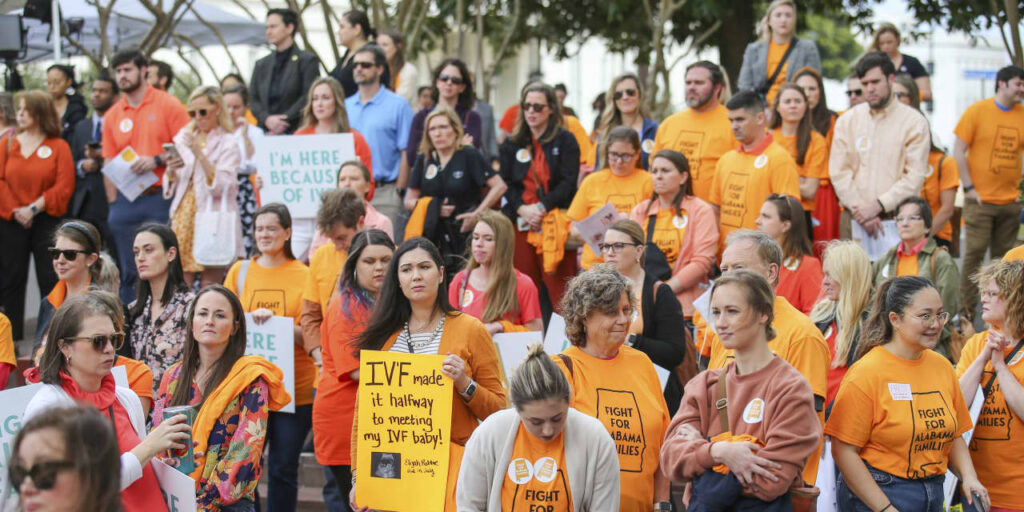The ruling earlier this month by Alabama’s top court that temporarily derailed in-vitro fertilization procedures in the state has put renewed focus on a fast-growing segment of the U.S. healthcare industry, one that has become an increasingly significant business over the past decade.
The Alabama judges laid out a legal framework that makes aspects of the IVF process untenable in the state, causing some clinics there to stop performing them.
On Thursday afternoon, Alabama legislators overwhelmingly passed a bill that would neutralize the effect of the ruling. The week of drama ignited by the state judges, however, highlighted the legal vulnerability of the procedure, while putting it at the top of the national conversation.
“This has elevated awareness around IVF,” says Pete Anevski, CEO of
Progyny,
one of a relatively new crop of companies in the IVF arena. “If you watch the reaction, how many issues … get bipartisan support so quickly? The reality is, it’s being recognized as a very real human need.”
Progyny,
which handles fertility care insurance coverage for employers, had $1.1 billion in revenue last year. The company has grown sales roughly 40% a year since it went public in 2019.
Progyny shares are down 12% since the Alabama court issued its ruling, though the company also issued financial guidance this week that came in below Wall Street expectations.
IVF procedures have become far more common in the U.S. over the past decade. The number of IVF rounds conducted in the U.S. more than doubled between 2012 and 2021, according to CDC data. That’s been facilitated by rapid expansion in insurance coverage: The consulting firm Mercer says that among employers with 20,000 or more employees, 62% cover IVF as of 2023, up from just 36% in 2015.
Progyny serves clients at nearly 400 employers across the country, and facilitated 58,000 assisted reproductive therapy cycles in 2023.
It is one of a handful of new players that has entered the field as the prevalence of IVF has expanded.
The Alabama ruling landed as a multiple trends push more hopeful parents towards IVF, including high rates of infertility worldwide.
Progyny’s Anevski, speaking before the state legislature’s vote, said that the response from Republicans and Democrats since the Feb. 16 ruling has been promising. Former President Donald Trump said early this week that he supports the availability of IVF, as do other Republican leaders.
“The positive data point on that is that there’s bipartisan support, whether it’s at the federal level, or whether it’s at the state level, including the state of Alabama, where the ruling happened, to protect IVF,” Anevski said.
Still, the ruling shows that IVF, a medical procedure responsible for more than 97,000 live births in the U.S. in 2021, faces significant legal vulnerability in at least some states.
IVF is a complex set of procedures that involves harvesting eggs from a woman’s ovaries, fertilizing them in a lab to turn them into embryos, and then implanting those embryos into a uterus. Frozen embryos are often saved to be used later if an initial implantation is not successful.
The Alabama court called those frozen embryos “unborn children” and ”extrauterine children,” and said that a group of parents whose frozen embryos had been destroyed could sue under a state law that allows parents to bring lawsuits over the wrongful death a child.
Since unused frozen embryos can be destroyed as part of the IVF process, that creates legal risk for the clinics. In a recent statement, the American Society for Reproductive Medicine, which represents reproductive health professionals, said that the ruling makes modern fertility care “unavailable to the people of Alabama.”
On Thursday, state legislators passed a law that would shield fertility clinics from the potential liabilities to which the State Supreme Court ruling exposed it.
Beyond the significant issues for families using IVF, the ruling adds uncertainty for investors. “There’s an inherent risk, a new risk that did not exist prior to the decision, that now exists for Progyny’s utilization trends today,” Michael Cherny, an analyst at Leerink Partners said prior to Alabama’s legislative vote. He rates Progyny stock at Outperform with a $48 target price. Shares closed Thursday at $36.52.
Progyny, one of the few relatively pure-play IVF stocks, has a market value of $3.3 billion and had operating income of $185 million last year. Wall Street analysts see that profit figure growing more than 20% annually for the next several years.
In the U.S., most IVF coverage is provided by commercial health insurers. As coverage has grown more widespread, one factor driving the increase has been the emergence of companies like Progyny, which offer specialized coverage of fertility services.
An employer that contracts with Progyny carves fertility benefits out of its health insurance coverage, and offers it through Progyny instead. There are a handful of similar offerings, including from Kindbody and Carrot Fertility. Progyny is the lone publicly traded name.
Progyny CEO Anevski says that his company’s program leads to better outcomes, including a higher live birth rate and a lower multiple-birth rate than the national average. That saves money for the employer, since it means fewer treatments and fewer costly high-risk pregnancies.
While coverage is growing across the board, Anevski says that Progyny is growing faster than the industry. The company’s members had 58,000 assisted reproductive therapy cycles in 2023, up from 42,600 in 2022 “We continue to grab the largest increase in market share versus all carriers and other competitors,” he said.
Progyny is somewhat insulated from state-specific laws. While some competitors own their own clinics, Progyny contracts with local providers. That gives the company flexibility to offer benefits across state lines for patients who might be prevented from seeking IVF in their own state.
Legislators in Florida had been pushing a bill that some experts said could have made IVF unfeasible in that state, though the bill was held up in the wake of the Alabama ruling.
Write to Josh Nathan-Kazis at josh.nathan-kazis@barrons.com
Read the full article here












